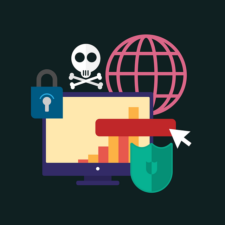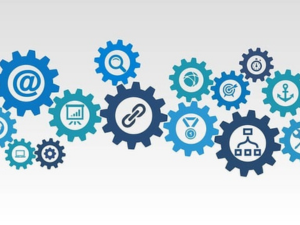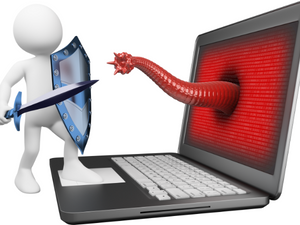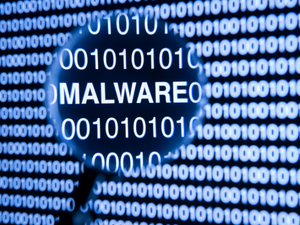
Businesses on Facebook Are Being Targeted by Password-Stealing Malware
With over two billion registered users, Facebook has become a target for advanced malware campaigns. These phishing campaigns steal unsuspecting users’ information. Businesses on Facebook are being targeted by password-stealing malware.

Discovering the Hidden Threat of Fileless Malware
What comes to mind when you hear the word malware? Most people may think of phishing messages containing malicious files. Once you download those files to your computer, they infect the entire system with a virus, making it impossible to use your computer.
While this type of cyber-attack is dangerous, there is another form of malware you need to be aware of. This guide provides an in-depth look at the threat of fileless malware and what you can do to protect yourself.

How to Simplify and Strengthen Your Data Security
One of the biggest threats businesses face today is unauthorized data access. There are many ways for hackers to get in and steal valuable data. It’s your job to make it as hard for them as possible. Here are some strategies to make your data security more robust and straightforward.

Protecting Your Business: Preventing and Detecting Ransomware Attacks
Ransomware is malware that accesses your network and locks you out of your system. It steals important data and files, locks them, and demands payment in exchange. Preventing and detecting ransomware attacks protects your business, digital assets, and staff from these subtle threats.

Securing Your Business Against Legion’s Malware Upgrade
The Legion commodity malware, known for its disruptive activities, was recently upgraded. This latest version can target Secure Shell (SSH) protocols and more cloud services, escalating the need for heightened cybersecurity measures.

Protect Your Business from Cyber Attacks: Common Cybersecurity Mistakes
Cybersecurity mistakes can cost your business a fortune and ruin customer trust. While experts expect cyber attacks to double in the next two years, more than half of small businesses have yet to invest in proper cybersecurity.
Cybersecurity doesn't have to cost a fortune. Avoid these common cybersecurity mistakes to keep your business secure against cyber attacks.

The Growing Trend of Telegram as a Marketplace for Phishing Tools and Services
Cybercrime is becoming increasingly common as businesses continue to rely on technology to conduct their operations. Cybercriminals are constantly looking for new ways to exploit businesses and individuals. One of the methods gaining popularity is using Telegram, a popular messaging app that offers end-to-end encryption. Telegram has become a hub for selling phishing tools and services due to its secure and anonymous nature.

Securing Your Online Collaboration: The Future of Workspace Protection
Keeping online workspaces safe is the top priority as more people work from home. A vital part of this is to secure your company's communication and exchange of information.

The Risks of IoT Devices: How to Secure Your Business
The Internet of Things (IoT) is a growing network of devices connected to the internet and each other. These include smart tools, security devices, wearables, and appliances. These devices make people's lives easier and more convenient. But they can also come with security risks that put businesses in danger.
Cyberattacks on IoT devices are increasing, so it's essential to understand common vulnerabilities.

OneNote’s Critical Security Update: Protecting Your Business from Malware
File attachments are one of the most common ways that computer malware spreads. As a result, Microsoft recently announced a critical security update for its note-taking app, OneNote.
The update aims to protect users from malware on OneNote. Up to 120 file extensions will be blocked.
Microsoft seeks to align OneNote's security measures with its other apps. For example, in the past, Microsoft rolled out similar updates in Outlook, Word, Excel, and PowerPoint. This update will be released between late April 2023 and May 2023.

Simplifying Cybersecurity: Microsoft’s Security Copilot AI Assistant
Microsoft released a game-changing way to protect against cyberattacks. This AI-powered assistant, called Security Copilot, can find threats faster than ever. It could revolutionize how businesses keep their digital assets safe.
Security Copilot uses OpenAI's GPT-4. Microsoft's "security-specific" AI model is also part of its structure. Security Copilot is designed to better summarize and make sense of threats than any tool before.

Hiatus Malware Targets Business Routers
There is a new malware campaign targeting business-grade routers. It is called Hiatus, a complex operation that deploys the HiatusRAT malware. It is a kind of Remote Access Trojan (RAT) that cybercriminals use to gain remote control over a target system.
Hiatus is the first of its kind. Lumen's security experts say it has been around since July 2022 and is still active. It gives business owners another reason to tighten cybersecurity. To help you protect your organization, here's everything you need to know about the malicious campaign.

Microsoft Exchange Server Antivirus Exclusions
The Microsoft Exchange Server is an e-mail server developed exclusively for Windows OS users. It also offers collaboration functions like scheduling and calendaring.
One of the Exchange Server's biggest draws is its high availability features. These features ensure that outages and server failures won’t disrupt server operations.
But while the Exchange Server sounds like a dream for users, it also has limitations. Microsoft warned against performing antivirus scans on some Exchange Server’s files, folders, and processes.

S1deload Stealer Malware
A new malware campaign on Facebook and YouTube is making headlines. S1deload Stealer hijacks these social media accounts, mines cryptocurrency, and spreads itself. Discover what business owners need to know about this malware.

AWS Warns Against Malvertising Targeting Users
Cybersecurity company Sentinel Labs has discovered a new malvertising campaign targeting AWS users. Sentinel Labs warns that cybercriminals have established a campaign on Google Ads programs that take users to a fake landing page to steal their credentials and other details.

Prilex Malware Blocks Contactless Payments to Steal Credit Card Information
The hackers behind Prilex PoS (point-of-sale) malware have developed a new way to steal credit card information to target customers using contactless or “tap-to-pay” payments.
Prilex PoS malware has stolen credit card information from payment terminals and ATMs before, but only if the customer physically inserts their card. Originally, the malware targeted ATM users withdrawing cash, but during the COVID-19 pandemic, more people began relying on digital payments. In 2021, contactless payments netted over $34.55 billion.
